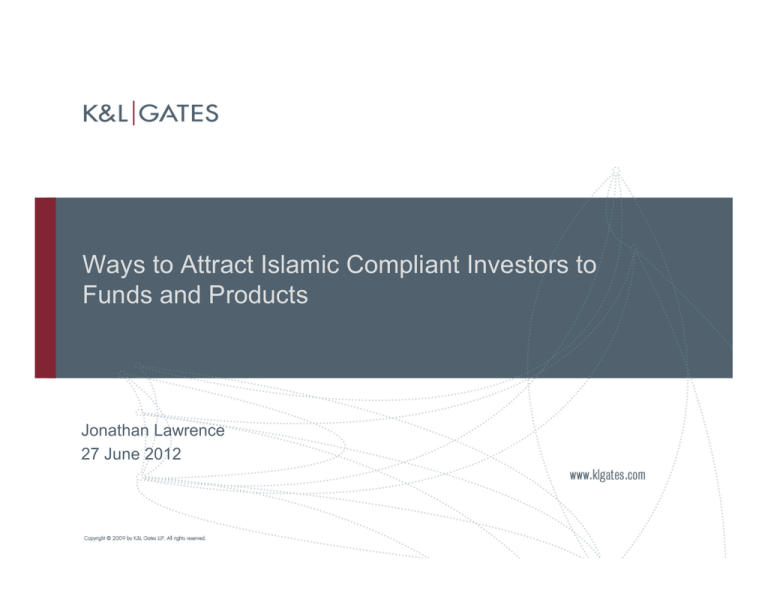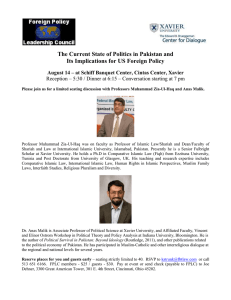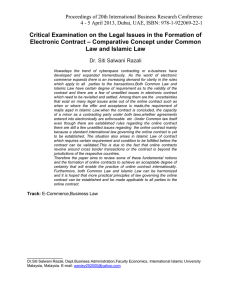
Ways to Attract Islamic Compliant Investors to
Funds and Products
Jonathan Lawrence
27 June 2012
The demographics
26.4% of the global population will likely be Muslim
by 2030
Currently 23% in 2012
Percentage of Muslims in Europe is around 5%
Source: Deutsche Bank, Global Islamic Banking, November 2011
2
Islamic asset management industry
2010: 7.6% increase in assets; 23 new islamic
funds; 46 funds liquidated
Large number of relatively small, equity-heavy funds
Focus on banking industry
Islamic fund universe: c. 100 fund managers,
managing 765 global islamic mutual funds (versus
c. 60,000 conventional funds)
Source: Ernst & Young Islamic Funds & Investments Report
3
Islamic fund sizes
Just over half of Islamic funds <$50m under
management
Almost 70% <$75m under management
Conventional funds of $22,000bn versus Islamic
funds of $52.3bn
Source: E&Y, Islamic Funds & Investment Report, 2010
4
Islamic fund composition
54% equities
17% money markets
15% mixed assets
7% real estate
5% seed capital
2% others
Source: Maybank Islamic, 2009
5
What is Shariah?
A means of conducting business through a distinct
set of rules designed to facilitate fairness
High correlation between Shariah compliant
investing and socially responsible investing
6
Shariah terms
Halal – that which is permitted or compliant
Haram – that which is not permitted
Riba – charging of interest
Gharar – uncertainty/ambiguity
Maysir – gambling; one party receives the other’s loss
Sukuk – Shariah compliant debt
Ijara – Shariah compliant lease
Takaful – Shariah compliant form of insurance
Mudaraba/Musharaka – forms of partnership
Murabaha – sale of commodity with the payment being deferred,
the mechanism being used as a fixed income substitute
7
Industry prohibitions
Gambling
Pork production or consumption
Adult Entertainment
Conventional banking and finance
Alcohol production or consumption
Tobacco production or use
8
Where are Shariah rules codified?
Interpretations of the Qur’an from various Islamic
schools of thought
Accounting and Auditing Organization for Islamic
Financial Institutions (AAOIFI)
The fact remains: Shariah mandates are not always
consistently applied from Scholar to Scholar.
Information is asymmetric, and Shariah Advisers
and lawyers skilled in the area become useful to
work through the counter-intuitive results
9
Islamic finance themes
Connection to underlying assets
Commercial risk taking by all parties (including
financier)
Entrepreneurship
Returns linked to actual investment outcomes
Sharing profit and loss
10
Islamic asset management challenges
Scholars and schools of thought
Lack of standardisation
Transaction costs
Asset ownership by financier involves potential
liability e.g. environmental, warranty claims
Insurance / takaful
Tax treatment
11
Ways to Attract
Islamic Compliant Investors to
Funds and Products
Fares Mourad, Head Islamic Finance
London 27th. June 2012
Sustainable Swiss Private Banking since 1841.
Numbers speak by themselves
In 2010 about 23.4% of world’s population are Muslims, and expected to reach
26.4% by 2030*
In numbers, this means an increase from 1.6 billion to 2.2 billion*
Muslims currently have a 7.7% share of global GDP which is expected to grow
to 8.7% by end 2017
50% of the Islamic Banking is in the GCC, while GCC Muslims with a population
of 38 million are a minority within the Muslim population.
Source: * The Economist, A waging crescent, 27th Jan 2011
13
Expansion of Islamic Banking 1995 - 2008
Source: World Bank, Policy Research working paper 55446
14
To attract, you need to know the motives
Identity and faith
Economic considerations
15
Competition on products
Unless the product is unique, competing on products, is ultimately a competition
on pricing
it is better to create an added value to the client
16
Islamic Financial Planning /
Estate and Succession Planning
Sustainable Swiss Private Banking since 1841.
Islamic world views on Financial Planning
18
Practical example I/III
Abdullah, enquired about his Zakat obligation, the zakat awareness arose on
the wake of his decision to perform the hajj. In addition to the recent preparatory
hajj course that he has been attending, he found out that he has to pay back
past dues (i.e. zakat not paid from his wealth in the past). Further, he believed
that zakat is only obligatory during the month of Ramadan, namely zakat el fitr,
which he never missed. of course his financial plans have not neglected the hajj
requirements and have always been within the ambit of his savings and
investment plan. To make this scenario more interesting, Abdullah has just
divorced his wife of 25 years and is planning to remarry later in the year. His exwife is holding on the company directorship and has successfully claimed her
rights to their matrimonial assets via the assistance of an established law firm.
19
Practical example II/III
The plot thickens, The wife-to-be is also divorced with three children under her
grace. with hindsight, Abdullah wants to plan his estate distribution firstly, to
ensure his present children ( his own flesh and blood) are provided for
sufficiently from his wealth, and secondly to make sure that his present assets
are not claimable by his future wife. Matrimonial assets would only be
accumulated from the date of marriage onwards. Abdullah plans to transfer
specific assets to be given to his wife-to-be via hibah ( )هﺒﻪor living gift.
to complicate things even more, Abdullah has only daughters, hence according
to the laws of faraid, this is the case of missing independent agnate exposing
the balance of the distribution to his living brothers or uncles or nephews.
Thus a detailed Islamic Estate Plan is required to meet his goals, especially in
the light of diverse locations of his assets. We already know that he has
properties in UK,USA and Australia and his daughters are currently studying.
20
Practical example III/III
Abdullah knows that the distribution of his estate is provided by faraid,
however, he is not particularly sure of the rights of his soon-to-be-step children
on his assets. Nor does he want to be unfair in providing for the needs of all his
dependents, whether they are blood children or by marriage.
thus he seeks full advice, on the matter including available options. Also
planning ahead, he would like to explore the idea of waqf or charity in perpetuity
as recommended in Islam.
Last but not least, issues related to pension, health insurance…etc should be
considered as well when planning.
21
Islamic and Conventional Financial Planning
Time horizon: the Muslim will live in the hereafter.
Sharia is the guide in creating strategies to achieve life goals.
Objective: Achieving Alfalah ()اﻟﻔﻼح.
22
Business conversion
Sustainable Swiss Private Banking since 1841.
Conversion requires a holistic approach
Banking and Finance
R&D
Sourcing
Production
Logistics
Sales &
Marketing
Human Resources
Source: Bank Sarasin, A.T. Keaney
24
Corporate conversion means that a web of issues need to
be considered
External
Internal
Governance
Sales
Group
Company
Market
Legal
Status
Production
Marketing
Public
Relations
Source: Bank Sarasin
Financial
Advertising
Sales
Financing
Purpose of conversion
If a company wishes to be Islamic, it cannot focus only on the business,
but on making business right in the eyes of Allah.
26
Important notice
This marketing publication has been prepared by Bank Sarasin & Co. Ltd, Switzerland, (hereafter “BSC”) for information purposes only. It contains
selected information and does not purport to be complete. This document is based on publicly available information and data (“the Information”)
believed to be correct, accurate and complete. BSC has not verified and is unable to guarantee the accuracy and completeness of the Information
contained herein. Possible errors or incompleteness of the Information do not constitute legal grounds (contractual or tacit) for liability, either with
regard to direct, indirect or consequential damages. In particular, neither BSC nor its shareholders and employees shall be liable for the opinions,
estimations and strategies contained in this document. The opinions expressed in this document, along with the quoted figures, data and forecasts,
are subject to change without notice. A positive historical performance or simulation does not constitute any guarantee for a positive performance in
the future. Discrepancies may emerge in respect of our own financial research or other publications of the Sarasin Group relating to the same financial
instruments or issuers. It is impossible to rule out the possibility that a business connection may exist between a company which is the subject of
research and a company within the Sarasin Group, from which a potential conflict of interest could result.
This document does not constitute either a request or offer, solicitation or recommendation to buy or sell investments or other specific financial
instruments, products or services. It should not be considered as a substitute for individual advice and risk disclosure by a qualified financial, legal or
tax advisor.
This document is intended for persons domiciled in countries where the Sarasin Group has a business presence. BSC does not accept any liability
whatsoever for losses arising from the use of the Information (or parts thereof) contained in this document.
© Copyright Bank Sarasin & Co. Ltd. All rights reserved.
Bank Sarasin & Co. Ltd
Elisabethenstrasse 62
P.O.Box
CH - 4002 Basel
Switzerland
Tel + 41 (0)61 277 77 77
Fax + 41 (0)61 272 02 05
www.sarasin.ch
27







